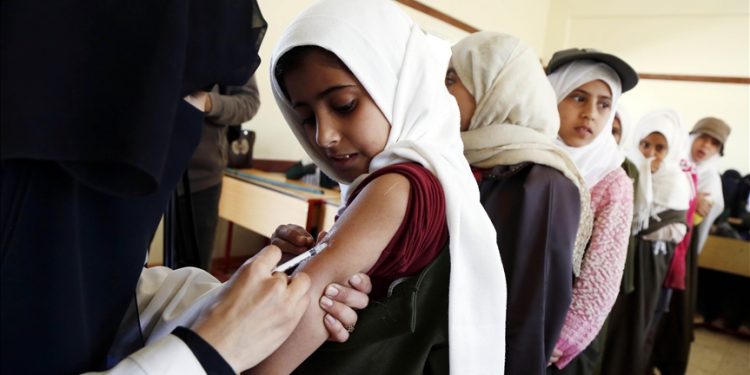Largest rise in unvaccinated children in 20 years fuels risk of measles outbreaks, putting lives at risk, say WHO and CDC
GENEVA
Reported measles cases have fallen compared to previous years, but progress toward the disease’s elimination continues to decline, creating dangerous conditions for outbreaks, a new report showed Wednesday.
In 2020, more than 22 million infants missed their first dose of measles vaccine – 3 million more than in 2019, marking the most significant increase in two decades, said the World Health Organization (WHO) and the US Centers for Disease Control and Prevention (CDC).
Compared with the previous year, reported measles cases decreased by more than 80% in 2020.
“While reported measles cases dropped in 2020, evidence suggests we are likely seeing the calm before the storm as the risk of outbreaks continues to grow around the world,” said Kate O’Brien, WHO’s director of immunization and vaccines.
Vaccinate quickly
“It’s critical that countries vaccinate as quickly as possible against COVID-19, but this requires new resources so that it does not come at the cost of essential immunization programs.”
O’Brien said routine immunization must be protected and strengthened; otherwise, “we risk trading one deadly disease for another.”
Measles is one of the world’s most contagious human viruses, but is almost entirely preventable through vaccination, said the WHO.
In the last 20 years, estimates are that the measles vaccine has averted more than 30 million deaths globally.
Estimated deaths from measles fell from around 1.07 million in 2000 to 60,700 in 2020.
However, measles surveillance also deteriorated, with the lowest number of specimens being sent for laboratory testing in more than 10 years.
Weak monitoring, testing and reporting for measles endanger countries’ ability to prevent outbreaks of this highly infectious disease, said the WHO and CDC.
Significant measles outbreaks occurred in 26 countries, accounting for 84% of all reported cases, in 2020.
“Large numbers of unvaccinated children, outbreaks of measles, and disease detection and diagnostics diverted to support COVID-19 responses are factors that increase the likelihood of measles-related deaths and serious complications in children,” said Kevin Cain, MD, CDC’s global immunization director.
“We must act now to strengthen disease surveillance systems and close immunity gaps, before travel and trade return to pre-pandemic levels, to prevent deadly measles outbreaks and mitigate the risk of other vaccine-preventable diseases.”
The ability of countries to ensure children receive both recommended measles vaccine doses is a crucial indicator of worldwide progress to measles elimination and preventing the spread of the virus.
First-dose coverage fell in 2020, and only 70% of children received their second measles’ vaccine dose, well below the 95% coverage needed to protect communities from the measles virus spreading.
Adding to the worsening of global immunity gaps, 24 measles vaccination campaigns in 23 countries, initially planned for 2020, were postponed because of the COVID-19 pandemic.
That left more than 93 million people at risk for the disease.







